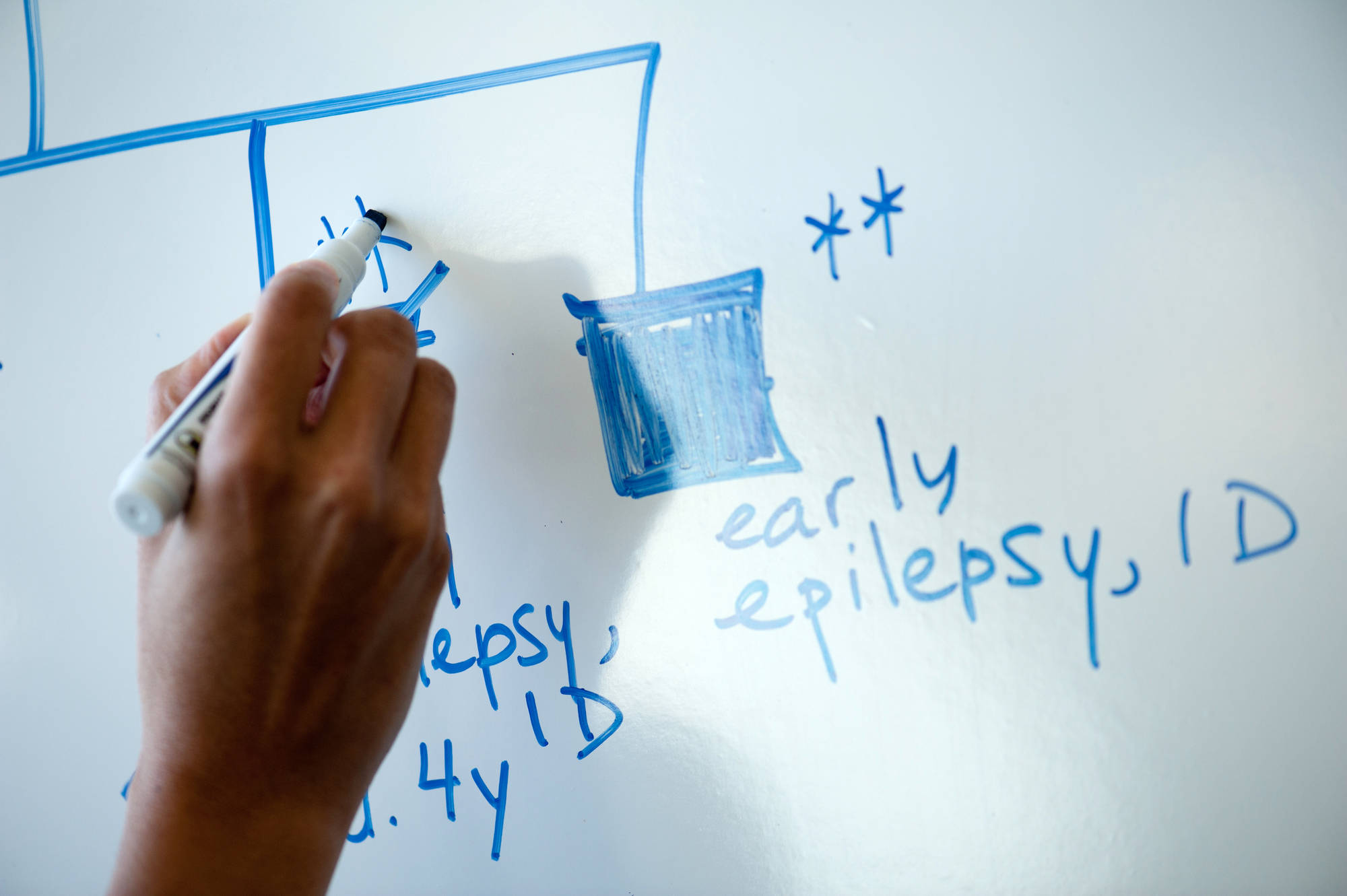Referrals
We welcome your referrals of any patients who have seizures or epilepsy. We generally recommend that any child who has failed first-line treatment be referred to a specialized epilepsy center, especially if they have failed two medications or have an abnormality on an MRI.

Ann Poduri, MD, of the Epilepsy Genetics Program charts the genetic underpinnings of certain epilepsy syndromes.
Clinical Neurophysiology/Epilepsy Fellowship Program
The Division of Epilepsy and Clinical Neurophysiology of the Department of Neurology at Boston Children’s Hospital offers an ACGME-accredited fellowship program in clinical neurophysiology or epilepsy with an optional second year for research or other subspecialty training, depending on funding availability.
Boston Children's is offering four positions within the following tracks via The NRMP® (National Resident Matching Program®), also known as The Match® for July 2025-June 2026:
- One-year pediatric epilepsy (ACGME ID: 1842418118)
- One-year pediatric clinical neurophysiology (ACGME ID: 1872421071)
- One-year pediatric epilepsy and one-year clinical neurophysiology (ACGME ID: 1842418118)
The 2024-2025 fellowship has been filled.
The fellowship program trains academically oriented physicians to become comprehensively trained pediatric clinical neurophysiologists and epileptologists familiar with the field’s state-of-the-art diagnostic and therapeutic methods.
Those who enter our fellowship have completed their training in child neurology.
By the end of their training year, fellows are eligible to take the clinical neurophysiology or epilepsy subspecialty boards of the American Board of Psychiatry and Neurology.
Content of the neurophysiology/epilepsy fellowship
The fellowship is divided into four rotations, covering each of the major services of the Division of Epilepsy and Clinical Neurophysiology:
Outpatient care: Fellows read all outpatient and ambulatory EEGs (excluding inpatient long-term monitoring studies). These studies are read by the fellow and reviewed and interpreted the same day with an attending neurophysiologist. We perform over 6,000 such studies per year. This rotation also includes a half-day continuity epilepsy clinic supervised by the division chief and other clinical epileptologists.
Inpatient epilepsy surgical service: During this rotation, fellows are involved in the clinical care of epilepsy patients admitted for various reasons, including long-term video EEG monitoring for characterization of clinical seizure episodes, both noninvasive and invasive pre-surgical evaluations, and admissions for seizure exacerbations or initiation of the ketogenic diet. Fellows interpret all inpatient long-term monitoring studies with an attending epileptologist. They also go to the operating room for intraoperative electrocorticography, placement of intracranial electrodes, or respective epilepsy surgeries, and assist in extra-operative functional brain mapping.
Epilepsy consult/medical service: The Epilepsy Consult Service sees epilepsy consultations in the hospital, including intensive care units and the Emergency Department, outside of the EMU, and provides EEG interpretation for all inpatient non-EMU EEGs. This rotation has intensive exposure to ICU monitoring and continuity of EEG interpretation and clinical correlation on critical care patients.
Elective rotation: The fourth rotation is dedicated to multiple elective opportunities and includes four weeks in adult EEG held at Beth Israel Deaconess Medical Center (another Harvard-affiliated teaching hospital). Electives are plentiful and include dedicated time in polysomnography/sleep medicine, MEG, computational neurophysiology, radiology research laboratory, ketogenic diet, tuberous sclerosis complex clinic, inflammatory/autoimmune epilepsy, and other opportunities.
Weekly teaching conferences throughout the year include the multidisciplinary Epilepsy Surgery Conference (at which the fellows present cases), EEG case conference, book club, clinical epilepsy lecture, and clinical neurophysiology lecture. In addition, there is a monthly journal club, epilepsy grand rounds, and the widespread lecture and seminar schedule available through the Department of Neurology and Harvard Medical School, including neurology grand rounds, neuroradiology, and neuropathology.
How to apply
Interested individuals should contact:
Stephanie Donatelli, MD
Director, Epilepsy Fellowship Program, Division of Epilepsy & Clinical Neurophysiology
Boston Children's Hospital
300 Longwood Avenue
Boston, MA 02115
Email: stephanie.donatelli@childrens.harvard.edu
Phone: 617-355-2413
Fax: 617-730-0463
Coral M. Stredny, MD
Director of Education, Division of Epilepsy & Clinical Neurophysiology
Associate Director, Epilepsy Fellowship Program
Boston Children's Hospital
300 Longwood Avenue
Boston, MA 02115
Email: coral.stredny@childrens.harvard.edu
Phone: 617-355-2413
Fax: 617-730-0463
Jacquelyn Crombie
Fellowship Coordinator
Boston Children's Hospital
300 Longwood Avenue
Boston, MA 02115
Email: Jacquelyn.crombie@childrens.harvard.edu
Phone: 617-355-8735
Please visit the AES website for more information about the process and timeline. All applications will be accepted via ERAS. For a complete application, we request your medical school transcript, personal statement, CV, and at least two letters of recommendation. Applicants must complete a residency in child neurology (accredited by ACGME, UCNS, or RCPSC) prior to starting the fellowship.
Boston Children's Hospital is the primary pediatric teaching hospital of Harvard Medical School.
END Technology Program
The Electroneurodiagnostic (END) Technology Program for medical personnel at Boston Children’s Hospital is a 12-month instructional program in the art and science of clinical neurophysiologic technology. The program runs from June to June, Monday-Thursday.
Our program trains technologists in EEG, evoked potentials, epilepsy monitoring, sleep technology, and related fields.
We also provide an optional three months of sleep and Long-Term Monitoring (LTM) training.
